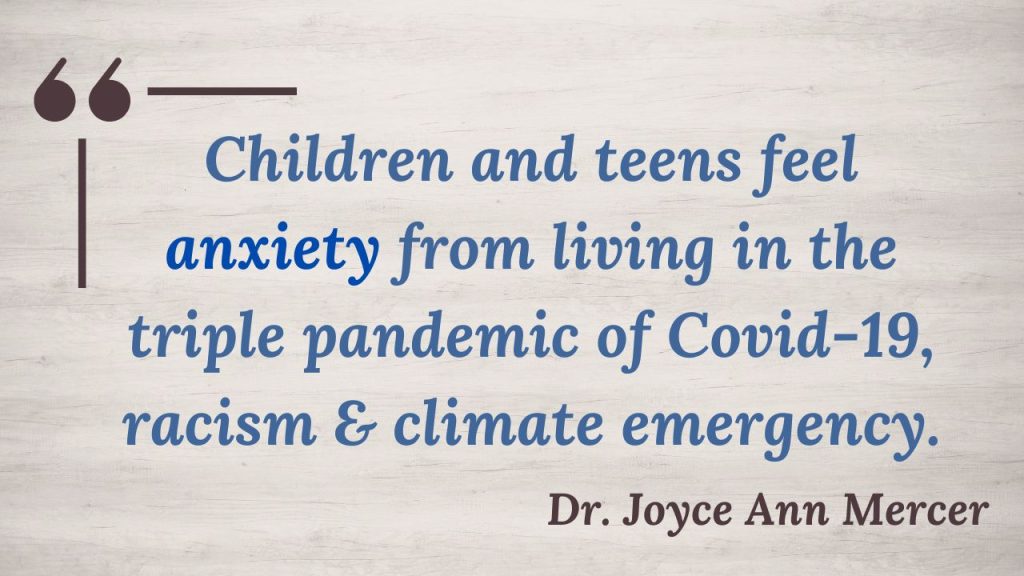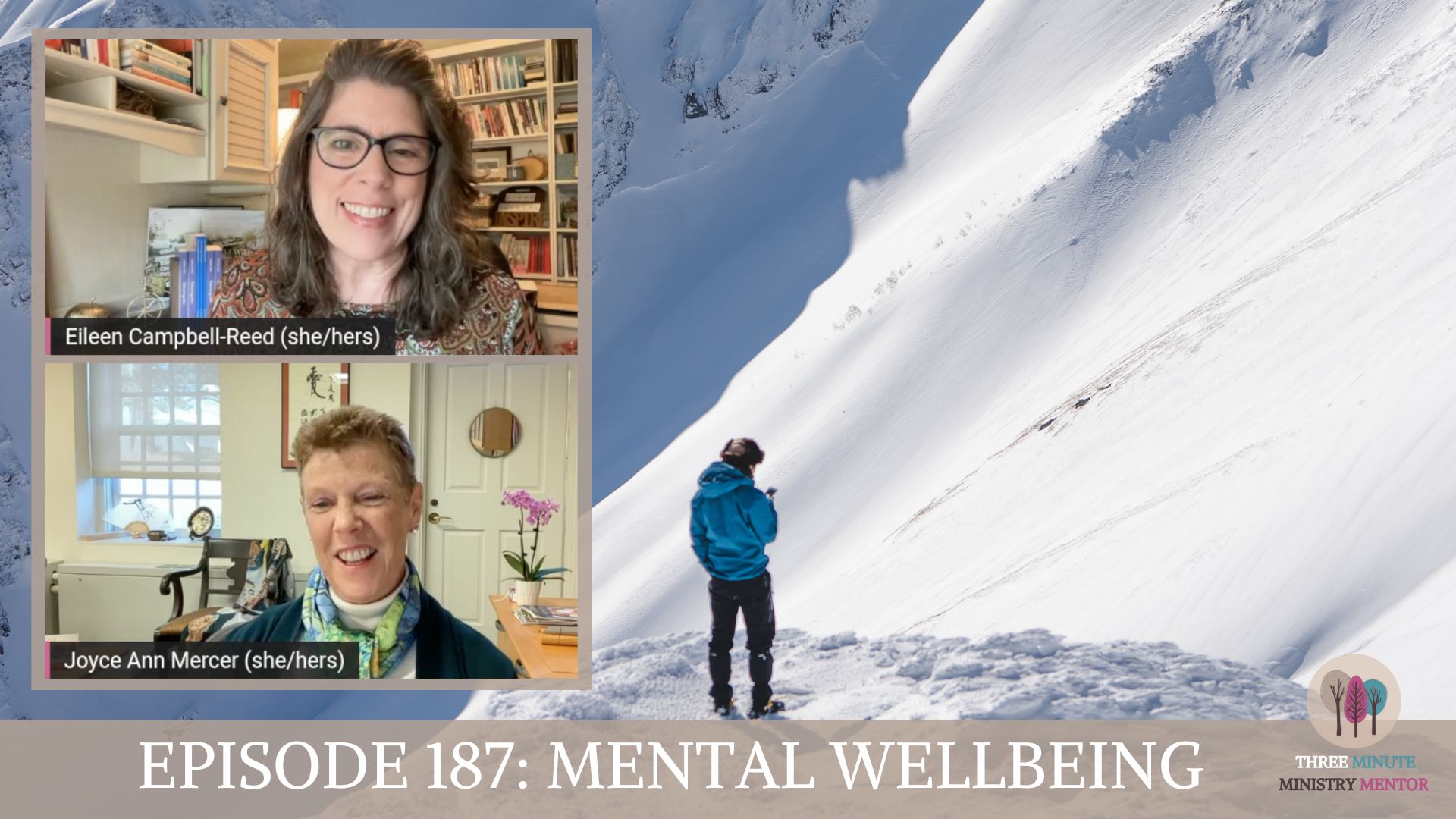We need to talk about the mental wellbeing of our children and teens.
These years of forming identity, re-modeling the brain, and flying further from the nest are already a big challenge. Add three calendar years of isolation, disrupted schedules and rites of passage, missed friendships and opportunities. And then stir in what Dr. Joyce Ann Mercer calls the “triple pandemic of Covid-19, racial reckoning, and climate crisis.” The result is a toxic stew of anxiety, depression, lethargy, behavioral outbursts, health issues, self harm, and the highest rates of contemplating suicide among teens in many years.
Our children and teens are not okay.  I hope your children and grandchildren are okay. But I know a lot of kids who are not doing well. According to the American Psychological Association, “At least 204,000 U.S. children and teens have lost parents and other in-home caregivers to COVID-19.” That’s the tip of the iceberg.
I hope your children and grandchildren are okay. But I know a lot of kids who are not doing well. According to the American Psychological Association, “At least 204,000 U.S. children and teens have lost parents and other in-home caregivers to COVID-19.” That’s the tip of the iceberg.
Today a story in the New York Times reported vast numbers of immigrant children in the U.S., here out of economic desperation, working adult jobs, struggling in school, and stressed by the need to support extended families.
Children and teens need our support, encouragement, language, rituals, and in some cases, our interventions to get them to a mental health care provider.
Let’s begin with what has changed
Two weeks ago the Centers For Disease Control (CDC) released a new report sharing data about from 2021 and comparing it to 2011. You can read the full report here: “Youth Risk Behavior Survey (2011-2021).”
Here are some startling findings from the (CDC) and (NPR)
1 of every 10 teen girls were raped
3 in 5 teen girls reported depressive symptoms in previous year
1 in 3 girls seriously considered attempting suicide
(up 60% from a decade ago)
14% of Black students attempted suicide in the previous year (up from 8% a decade ago)
70% of LGBTIQA+ teens felt persistent sadness and hopelessness in the
previous year
50% of LGBTIQA+ teens experienced mental distress in the last 30 days
1 in 5 LGBTIQA+ teens attempted suicide in the previous year
69% of youth aged 12-17 felt the impact of Covid-19 on their mental health (SAMSHA)
The rates of risky drug use, teen pregnancies, and STDs are down, but the toll on youth mental health is up across the board.
Teens and especially girls and LGBTIQA+ youth are experiencing higher rates of bullying, cyberbullying, sexual violence and other traumas, feelings of sadness, loneliness and hopelessness. They are getting less face-to-face connections with peers and adults.
If you are reading this and find yourself struggling with thoughts of suicide, you can call or text 988 and talk to someone at the Lifeline. They are available 24/7. If you are reading this and your concern level is going up for children and youth in your home, extended family, church, neighborhood or school, keep reading.
If you are reading this and your concern level is going up for children and youth in your home, extended family, church, neighborhood or school, keep reading.
How do we help our children with mental wellbeing?
Recently I talked with Dr. Joyce Ann Mercer, Associate Dean for Academic Affairs, and the Horace Bushnell Professor of Practical Theology and Pastoral Care at Yale Divinity School. In this final segment of our conversation, I asked an unplanned question.
How do we need to be paying attention to our children and youth who are suffering in their mental wellbeing in the wake of the multiple pandemics?
I know that Joyce studies the religious and spiritual lives of girls. I know she has a young adult daughter. And I had the feeling she would have thoughts about how church leaders need to pay attention to what is happening with our children. We recorded this interview in January. Then the news came from the CDC in February about the extreme changes to mental wellbeing in youth in the US.
The timing is just right to help us think with urgency about how to care for our young people. Joyce shares wisdom about mental wellbeing in today’s (6-min) video conversation.
Understanding anxiety
I am grateful that Joyce understands some deeper things going on right now culturally — things mirrored in the mental health metrics of teens in the U.S. Some anxiety is normal and to be expected given all we have lost in the past three years. This is true for children and teens, as well as adults.
Solid support and relationships will buffer the long-term wellbeing of children who experienced these losses. The high levels of anxiety among children and teens at the present are also like a canary in the mine. They signal to us. We need to pay attention to the losses, grief, and suffering that are impacting all of us.
And how do we help? Well Joyce has wisdom to share. I hope you as a church or religious leader to take her advice to heart. I know I am.
As you head to church Sunday morning, we hope you may follow the wisdom of Dr. @joyceannmercer of @YaleDivSchool.
Our children & teens are struggling. We can support, empower, and love them through it.
How are you using your #pastoralimagination to care for children? pic.twitter.com/Fga0bEiF7C— Three Minute Ministry Mentor (@3MinuteMin) February 26, 2023
How to take steps of caring for our youth
- Empower children and teens with a sense of action and agency: rather than stay isolated in sadness and loneliness, help them connect with friends, caring adults, and your community of faith. Help them claim the ways they can be a part of making social justice, or begin working to intervene in the climate emergency. Youth activism in these areas not only helps the planet it also helps the young people psychologically.
- Give language to their experiences: see it, name it, help them say it. Listening to anyone talk about their lives, their loves, and their concerns and suffering, is by itself helpful. When we listen attentively, we are helping them name their experience.
- Help them tell a new story: what happened to all of us since 2020 is not the end of the story. It changed so much and took away people and ways of life that we loved and to which we felt attached. Yet now is the time to tell new future stories. We all need to dream a little and see the new world that is emerging.
Catching Up with Dr. Joyce Ann Mercer
Have you watched all of our conversations with Joyce? You’ll find all the episodes here. And you can also listen to our conversations on the Three Minute Ministry Mentor Podcast. Or subscribe to the 3MMM podcast wherever you like to listen.




